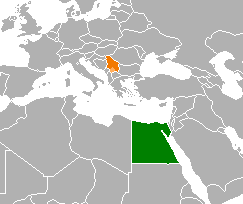Foreign relations of Serbia are accomplished by efforts of the Ministry of Foreign Affairs. Serbia has inherited the Ministry of Foreign Affairs, along with all of its holdings, after the dissolution of the previous state union with Montenegro. Serbian foreign ministries continue to serve citizens of Montenegro in countries that do not have Montenegrin diplomatic presence. The governments of Serbia and Montenegro expressed an interest in pursuing a common foreign policy. Former President of Serbia Boris Tadić referred to relations with the European Union (EU), Russia, United States and China as the four pillars of foreign policy. Serbia joined the United Nations on 1 November 2000.

The Ministry of Foreign Affairs of the Republic of Serbia is the ministry in the government of Serbia which is in the charge of maintaining the consular affairs and foreign relations of Serbia. The current minister is Marko Đurić, in office since 26 October 2022.

Japanese-Serbian relations are the bilateral relations between Japan and Serbia. Both countries have signed diplomatic missions on May 20, 1997. Japan has an embassy in Belgrade and Serbia has an embassy in Tokyo and an honorary consulate in Osaka.
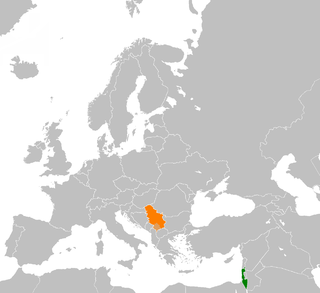
The diplomatic relations between Israel and Serbia were established on January 31, 1992, when Serbia was part of FR Yugoslavia. Israel has an embassy in Belgrade and Serbia had one in Tel Aviv. Yugoslavia was the second country in Europe to recognize Israel in 1948. The two countries have economic and cultural ties, helped by a sizable community of Jews from the former Yugoslavia in Israel. Serbia agreed to move its embassy to Jerusalem on 4 September 2020 but decided not to after Israeli recognition of Kosovo as a sovereign state, something Serbia disputes.

Serbia–Slovenia relations Before 1991, both countries were part of Yugoslavia. Slovenia gained its independence after the Ten-Day War. Both countries established diplomatic relations on 9 December 2000. Serbia has an embassy in Ljubljana. Slovenia has an embassy in Belgrade.

Foreign relations exist between Austria and Serbia and their predecessor states. Austria has an embassy in Belgrade. Serbia has an embassy in Vienna and a general consulate in Salzburg. Austria is a European Union member and Serbia is a European Union candidate.

French-Serbian relations are foreign relations between France and Serbia. Both countries established diplomatic relations in 1839, between the Kingdom of France and the Principality of Serbia.
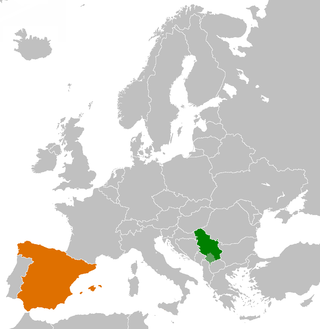
Serbian-Spanish relations are foreign relations between Serbia and Spain. Both countries established diplomatic relations on October 14, 1916. Serbia has an embassy in Madrid. Spain has an embassy in Belgrade. Both countries are member states of the United Nations, Interpol, Council of Europe and Organization for Security and Co-operation in Europe. Spain is member state of the European Union since 1986 and Serbia is a candidate country since 2012 negotiating its future membership which Spain is strongly supporting. Spain is member state of NATO alliance while Serbia is a militarily neutral country with strong historical relations with the Non-Aligned Movement. In relation to third parties, both countries supported position of Argentina in its Falkland Islands sovereignty dispute with the United Kingdom in the past.

Serbian–Turkish relations are foreign relations between Serbia and Turkey. Serbia has an embassy in Ankara and a consulate-general in Istanbul. Turkey has an embassy in Belgrade. Both countries are full members of the Council of Europe, the Organization for Security and Co-operation in Europe (OSCE), the Central European Free Trade Agreement (CEFTA) and the Organization of the Black Sea Economic Cooperation (BSEC). Turkey is a member of NATO. Serbia instead is not a member of NATO.

Iraqi–Serbian relations are foreign relations between Iraq and Serbia. Iraq has an embassy in Belgrade, and Serbia has an embassy in Baghdad.
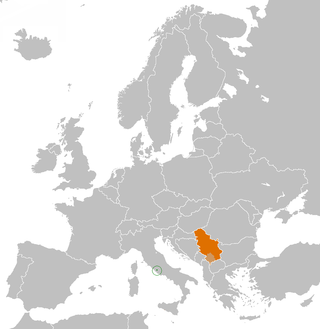
Holy See–Serbia relations are foreign relations between the Holy See and Serbia. Both countries established diplomatic relations in March 1919. The Holy See has an embassy in Belgrade. Serbia has an embassy to the Holy See in Rome.

Algeria and Serbia maintain diplomatic relations established between Algeria and SFR Yugoslavia in 1962, following Algeria's independence. Algeria has an embassy in Belgrade. Serbia has an embassy in Algiers.
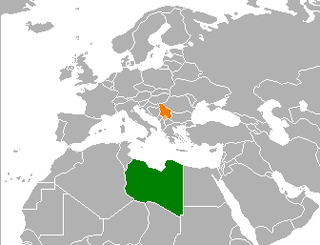
Libya–Serbia relations are diplomatic relations between Libya and Serbia. Libya has an embassy in Belgrade and Serbia has an embassy in Tripoli.

India–Serbia relations are foreign relations between India and Serbia. India has an embassy in Belgrade. Serbia has an embassy in New Delhi and an honorary consulate in Chennai. Both countries are key allies and were founding members of the Non Aligned Movement with Serbia being part of Socialist Federal Republic of Yugoslavia at the time. India was one of the nations that cosponsored the proposal to readmit the Federal Republic of Yugoslavia to the United Nations in 2000. India backs Serbia's position regarding Kosovo and supports Serbia's EU integration process. During her visit to Belgrade in 2013, Indian minister of state for external affairs Preneet Kaur stated that she hopes that Serbia will continue to support reforms in international bodies, including the United Nations, and India's bid to become a permanent member of the UN Security Council. In an interview for local media, H.E. Narinder Chauhan, Indian Ambassador to Serbia stated that "Despite of Breakup of Yugoslavia our political relations continue to be exceptional, marked by a long tradition of mutual support on issues of core interest... It is a matter of immense satisfaction that Serbia also supports India’s international role. India sees Serbia as a reliable partner."

Angola–Serbia relations refers to bilateral relations between Angola and Serbia. Angola and Socialist Federal Republic of Yugoslavia established diplomatic relations in 1975, following Angola's independence. Angola has an embassy in Belgrade, and Serbia has an embassy in Luanda, Alvalade.
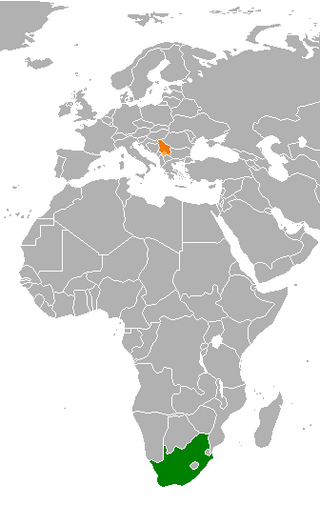
South Africa–Serbia relations are foreign relations between South Africa and Serbia. Serbia has an Embassy in Pretoria and South Africa a non-resident Embassy in Athens, Greece which is also accredited to Serbia.
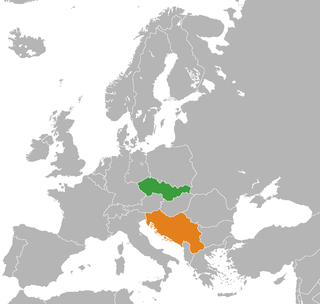
Czechoslovakia–Yugoslavia relations were historical foreign relations between Czechoslovakia and Yugoslavia, both of which are now-defunct states. Czechoslovakia and the Kingdom of Serbs, Croats and Slovenes were both created as union states of smaller Slavic ethnic groups. Both were created after the dissolution of Austria-Hungary, itself a multinational empire unable to appease its Slavic populations or implement a trialist reform in its final years.
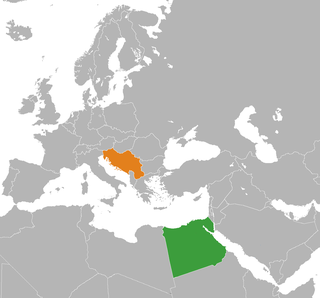
Egypt–Yugoslavia relations were historical foreign relations between Egypt and now break-up Yugoslavia. Both countries were founding members and prominent participants of the Non-Aligned Movement. While initially marginal, relations between the two Mediterranean countries developed significantly in the aftermath of the Soviet-Yugoslav split of 1948 and the Egyptian revolution of 1952. Belgrade hosted the Non-Aligned movement's first conference for which preparatory meeting took place in Cairo, while Cairo hosted the second conference. While critical of certain aspects of the Camp David Accords Yugoslavia remained major advocate for Egyptian realist approach within the movement, and strongly opposed harsh criticism of Cairo or proposals which questioned country's place within the movement.

Belgium–Yugoslavia relations were historical foreign relations between Belgium and now split-up Yugoslavia. During the time of Yugoslav existence both countries were European multicultural societies and both implemented federalization reforms in the 1970s with the beginning of the state reform in Belgium and adoption of the 1974 Yugoslav Constitution.

Foreign relations of Yugoslavia were international relations of the interwar Kingdom of Yugoslavia and the Cold War Socialist Federal Republic of Yugoslavia. During its existence, the country was the founding member of numerous multilateral organizations including the United Nations, Non-Aligned Movement, International Monetary Fund, Group of 77, Group of 15, Central European Initiative and the European Broadcasting Union.
